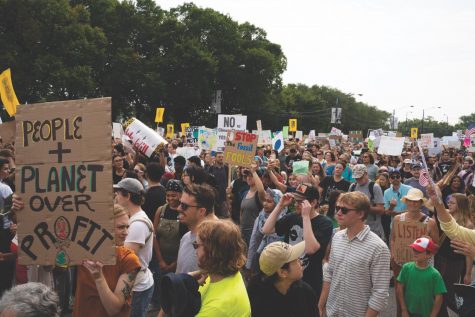Student group aims to start climate change conversation, look at local and global effects
February 9, 2021

When freshman film major Gerson Matias-Ryan heard President Joe Biden reentered the Paris Climate Agreement Jan. 20, he was hopeful but realistic about the fact that more needs to be done to combat the effects of climate change.
“My first thought was, ‘Yes, another baby step in the right direction,’” Matias-Ryan said. “This is in no way like, ‘Yay, we’re going to fix climate change now.’ It’s not that simple, but that doesn’t mean that it’s not something important.”
In addition to reentering the Paris Agreement, a global initiative to lessen the effects of climate change originally signed in 2016, Biden also canceled the construction of the Keystone XL Pipeline. The project was widely protested due to environmental concerns and concerns about its assembly and impact on Native American land.
These actions mark the first steps Biden has taken to fulfill his promise to address climate change.
Although his decisions make a national impact, Columbia students are doing what they can to raise awareness of climate change at the local level.
The Columbia College Chicago Climate Change Crisis Community is a group created to educate students about the climate crisis.
The club was formed in 2020 by freshman acting major Alana Gross and freshman film major Wren Sager after they discovered Columbia did not have an environmentalist club.
“We made the climate change club because we thought that it was something important that Columbia didn’t already have,” Sager said. “We saw a need for a group such as ourselves to at least get the conversation started.”
The club, which currently has 13 members, meets once a month on Sundays over Zoom. For each meeting, a local environmentalist is invited to talk about a particular subject, and afterward the group holds a discussion on the topic.
Sager said the group hopes to make it clear the issue of climate change has a far greater impact than some Columbia students may realize.
“[Biden] talked a lot about helping communities of color, especially in low-income communities in regard to environmental impact, ” Sager said. “I would like to see him actually take steps to carry out what he says he’s going to do and help these communities.”
Under former President Donald Trump, the U.S. began formally withdrawing from the Paris Agreement in November 2019 and officially withdrew a year later in November 2020. Biden signed an executive order on Jan. 20, officially reentering the U.S. in the agreement.
“The U.S. is signaling its intent to be a leader and a partner in the global fight,” said Michelle Carr, director of Illinois’ Nature Conservancy. “This is really important [because] … the U.S. stands as one of the largest producers, the second behind China, of greenhouse gas emissions, and … we’re the largest producer cumulatively.”
Carr would like to see Biden show his support for bipartisan action on climate change at the federal level. She said doing so would also open the door for states to take bold action to reduce greenhouse gas emissions.
Biden’s decision to reenter the agreement was praised widely by many environmentalists, though they made it clear it is not enough.
Howard A. Learner, president and executive director of the Environmental Law and Policy Center, wrote in an op-ed for the ELPC that reentering the agreement is a good start, but it is not a one-and-done fix.
In the piece, Learner said the U.S. needs to begin investing in innovative clean energy and clean transportation technologies.
He said making the shift toward electric vehicles and renewable energy not only creates jobs in the Midwest but also reduces pollution.
Gross said Biden should look at the large impact of the agricultural system in particular. According to a 2019 report by the World Resource Institute, agriculture generates 25% of global greenhouse gas emissions annually.
To help reduce these emissions, Gross said she thinks farmers should switch to regenerative agriculture, which focuses on restoring soil that has been damaged by the current industrial farming method.
Sager said Biden has a responsibility to be a leader in the fight against climate change.
“There’s so much innovation happening within the environmental field, especially in the past 10 to 15 years,” Sager said. “So if Biden could start bringing awareness and leading us more into the direction of being able to fully utilize some of these newly developed techniques and technology, that would be great.”







